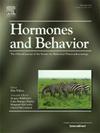Hormonal contraceptives modulate resilience to psychiatric and neurodegenerative disease
IF 2.4
3区 医学
Q2 BEHAVIORAL SCIENCES
引用次数: 0
Abstract
Hormonal contraceptives (HCs) are one of the most widely used classes of drug worldwide and are a critical part of women's health. Beyond their primary use for birth control, HCs exert many health benefits, including treatment of menstrual-related symptoms and reduced risk of certain types of cancers. Here, we focus on the role of HCs in promoting resilience to depression and Alzheimer's disease. Although risks for depression with HC use have been widely stated, HCs only increase risk for up to 10 % of users, and conversely improve mood and protect against depression for many others. Emerging evidence also suggests that HC use protects against age-related cognitive decline and Alzheimer's disease, even decades after HC use. We propose that these effects are due to modulatory effects of HCs on stress-related signaling and neuroimmune function. In this paper, we discuss how HCs interact with stress responsivity, neuroimmune signaling, and other individual differences to promote resilience or susceptibility to psychiatric and neurological disorders.
激素避孕药调节对精神和神经退行性疾病的恢复力
激素避孕药是世界上使用最广泛的药物之一,是妇女健康的重要组成部分。除了主要用于节育之外,hc还具有许多健康益处,包括治疗月经相关症状和降低某些类型癌症的风险。在这里,我们关注hc在促进抑郁症和阿尔茨海默病的恢复能力中的作用。虽然使用大麻有抑郁症的风险已经被广泛指出,但大麻只增加了高达10%的使用者的风险,相反,对许多其他人来说,大麻可以改善情绪,防止抑郁。新出现的证据还表明,使用HC可以防止与年龄相关的认知能力下降和阿尔茨海默病,即使在使用HC几十年后也是如此。我们认为这些影响是由于hc对应激相关信号和神经免疫功能的调节作用。在本文中,我们讨论了hc如何与应激反应、神经免疫信号和其他个体差异相互作用,以促进对精神和神经疾病的恢复力或易感性。
本文章由计算机程序翻译,如有差异,请以英文原文为准。
求助全文
约1分钟内获得全文
求助全文
来源期刊

Hormones and Behavior
医学-行为科学
CiteScore
6.70
自引率
8.60%
发文量
139
审稿时长
91 days
期刊介绍:
Hormones and Behavior publishes original research articles, reviews and special issues concerning hormone-brain-behavior relationships, broadly defined. The journal''s scope ranges from laboratory and field studies concerning neuroendocrine as well as endocrine mechanisms controlling the development or adult expression of behavior to studies concerning the environmental control and evolutionary significance of hormone-behavior relationships. The journal welcomes studies conducted on species ranging from invertebrates to mammals, including humans.
 求助内容:
求助内容: 应助结果提醒方式:
应助结果提醒方式:


